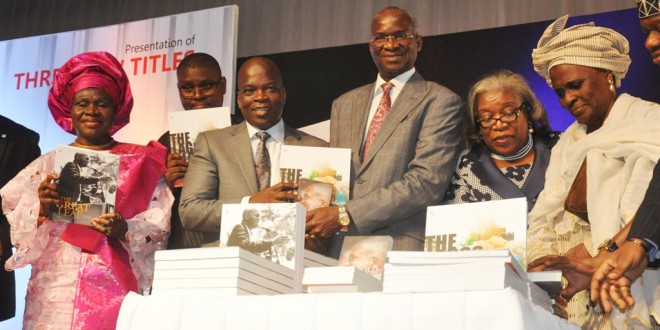ADDRESS DELIVERED BY HONOURABLE MINISTER OF POWER, WORKS AND HOUSING, BABATUNDE RAJI FASHOLA, SAN AT THE 5TH NATIONAL COUNCIL ON LANDS, HOUSING AND URBAN DEVELOPMENT, HELD IN ILORIN, KWARA STATE
Ladies and Gentlemen:
I would start this address by expressing the gratitude of the Federal Government to the government and people of Kwara State for accepting to host this annual council of Lands, Housing and Urban Development.
His Excellency, Mr. Abdulfatah Ahmed and members of his government especially the Commissioner for Housing and Urban Development, Hon. Muideen Alalade have been wonderful hosts by all accounts against the odds.
Indeed, it is against the odds. This is because there was every excuse to avoid some of the expenses, no matter how little, that hosting this event have demanded.
This is because of the competing demands for increasingly hard to earn income amidst the various needs that state and local governments have to fund.
But just as the Federal Government has committed to spend more in spite of earning less, in order to provide inclusion, and create jobs, I salute the committed leadership that the Governor of Kwara is providing, and the policies that are being implemented.
This is the kind of leadership that is required in difficult global economic environments in which no one is spared.
It is such forward looking, problem-solving initiatives that inform the choice of this year’s theme which is: “Building Adequate Capacity of Professionals, Artisans and Tradesmen in the built environment.”
As you will be aware, one of the decisions taken by the Buhari administration is to increase capital spending in the 2016 budget to 30% of the N6.06 Trillion total budget.
This is change for some of those who ask what has changed.
It is a welcome departure from spending 10% of N4 Trillion as capital expenditure.
What this means is that unlike in the past, up to 2015, when only about N400 Billion was planned for capital spending and indeed much less was actually spent, in 2016 about N1.8 Trillion is planned for capital spending with a commitment to fund it.
But this is not the end or purpose. This is only the means to get to the end.
The end is to reflate and stimulate the economy back to growth.
To provide opportunity for inclusion, whereby the growth translates to employment, provides incomes for ordinary and hard-working people; who are then able to put food on their tables and participate in the building of Nigeria.
But I must also advise that inclusion and employment will not happen, if the people for whom the budget is made, abdicate the responsibility for building, to foreigners, or prefer foreign goods to locally made ones.
What will happen is that the budget will work, the money will be spent, and the benefit will be transferred to foreign countries and factories where the professionals reside or where their imported goods are made.
So one objective of this council meeting and its theme is to emphasize to all members of the built environment that it is only those who are willing to act, who are willing to work, and who are willing to get their hands dirty, by blasting rocks, moving sand, cement, iron rods, making doors, molding blocks, pouring concrete and so on that will readily find inclusion in this economic process.
This is the same process that built Europe’s infrastructure, that of China and many parts of the Middle East.
It is the process by which we will rebuild our economy. This is part of what diversification means. This is part of what the President means when he talks about diversifying the economy through agriculture and mining.
It is from agriculture that we will get wood and timber to build, and from mining we will get sand, rocks, cement and tiles to furnish our houses.
This is why our housing policy is critical to drive the economy in this direction.
Last week, I unveiled our housing roadmap and the progress we have made, and the steps that remains to be completed.
I will repeat some of what I said without being too long.
First is that a national housing program must have national acceptability in terms of diversity of design in response to cultural and climatic diversities.
We have finalized and settled on 6 (Six) designs classified into 2(Two) broad sets of designs : a. bungalows in the north and b. blocks of flats in the south.
All of these were achieved by our local architects in the Ministry with a voluntary contribution from outside the ministry but with all of it totally home grown. (So the inclusion and capacity building has started from the design stage).
The next step is to standardize these designs, windows and fittings and all of these have been done – Again by local capacity.
The third step is to build industrially and reduce construction time. We are using local capacity to leverage international capacity to achieve this.
I listened to a Report yesterday that the Empire State Building, a 102-storey building was built in the time of the great Economic depression by 3,400 in only 13 months .
This is the type of capacity and inclusion we seek to develop to inspire hope.
The fourth step is to provide fittings locally and we have resolved to use only the following Made in Nigeria items:
i. Doors
ii. Windows
iii. Tiles
iv. Ceilings
v. Plumbing accessories
vi. Cables
vii. Paint
viii. Iron – mongery
This is where we hope to receive the support of local builders, artisans and tradesmen in capacity building.
There will be no capacity without opportunity.
We are offering the opportunity.
Other issues such as financing and mortgages are not relevant for our purpose today.
What is relevant to our purpose is that we will require hundreds of thousands of doors, windows, roofing materials, gallons of paint, plumbing materials and other accessories. They will have to be produced by our men and women.
Therefore as a government, the Buhari administration has provided the opportunity for the professionals, artisans and tradesmen in the built environment to show what they can do and build capacity, while building Nigeria.
Ladies and gentlemen, still on capacity building, let me also say that in the Power and Works sections of our Ministry, our attitude is no different.
Not only are we aggressively pursuing our roadmap of incremental to stable and ultimately uninterrupted power, the Ministry has encouraged the use of locally made meters, wires and galvanized sheets for Transmission equipment and we are seeing some positive if not yet sufficient responses.
This is the way to keep jobs at home and build capacity for inclusion.
Our road construction is also based on achieving our economic objectives of growth through critical sectors in the short term.
Therefore, with limited resources, we have chosen roads that connect states, roads that evacuate goods from Sea and Airports, roads that transport agricultural produce and roads that bear very heavy traffic.
While we cannot cover all the roads across the country, you will agree with me that roads like Sokoto-Kotangora-Makera Highway, Kano-Maiduguri, Jebba-Ilorin – Bode-Sadu, Ogbomoso- Oyo; Lagos – Ibadan; Loko- Oweto, 2nd Niger Bridge, Enugu – Port Harcourt Roads, fall within this category.
Ladies and gentlemen, let me say with all emphasis that our capacity as a people is bigger than the sum total of our problems.
Problems must challenge us, as they now do, to deliver the best of our capacities, and we must resist the temptation to address our problems by clichés.
One cliché that has dominated the public discourse about our built environment and artisanal capacities is that it is dominated by foreign nationals such as Togolese and other West African citizens.
With respect, that is not the accurate picture.
Yes, there may be Artisans from foreign West African countries on our construction sites, but it is not because we are unable.
It is partly because our Economy is bigger than their own and they come to seek for inclusion and opportunity in the sub-region beyond the shores of their country.
It is also because we are signatories to a treaty of free movement in the ECOWAS sub-region otherwise you are unlikely to see them in such numbers if they cannot freely cross the borders.
It is also partly because we are focused more on other sectors such as banking, oil and gas and telecoms.
This is why you will see that in Gambia, out of 12 (TWELVE) or so banks, 11 (ELEVEN) are Nigerian. This does not mean that Gambians cannot bank.
This is why you will see that our Telecoms, Oil and Gas companies and even our cement companies are dominating the sub-regional landscape.
What we must therefore do if we wish to dominate the built environment is to make it worthwhile.
We can do this by training people, which we have done for almost a decade at state and federal level. But that is not enough.
We must now consciously promote economic opportunity by budgeting for capital spending and utilizing homegrown and homemade materials as we have now resolved to do.
Indeed, please ask yourself why anybody wants to spend his time being an engineer or artisan when government has been spending less than 10% of the public purse on capital projects.
Why will people not go and ride motorcycles, or look for oil and kerosene supply allocations, when construction companies have been owed for work done since 2014.
Why will our artisans want to build when construction of houses is not an on-going and yearly exercise.
Yes we are all building roads, schools and bridges.
But how many housing estate construction is going on in all the 36 States, and with what intensity , and regularity; even at the time we earned more petro dollars.
Now that the petro dollar has reduced, I argue that this is the time to make the scarce resources do more , include more people and deliver more value.
One way to do this is for states to spend more on housing construction. (1,000 on 1 (One) Hectare).
This is the change that the Buhari government brings and this is the importance of this year’s theme, of “Building the capacity of professionals, artisans and tradesmen in the built environment.”
Let us build houses for ourselves, by ourselves, in order to build our own prosperity.
Babatunde Raji Fashola, SAN
Honourable Minister of Power, Works and Housing
 Hottestgistnaija.com
Hottestgistnaija.com





